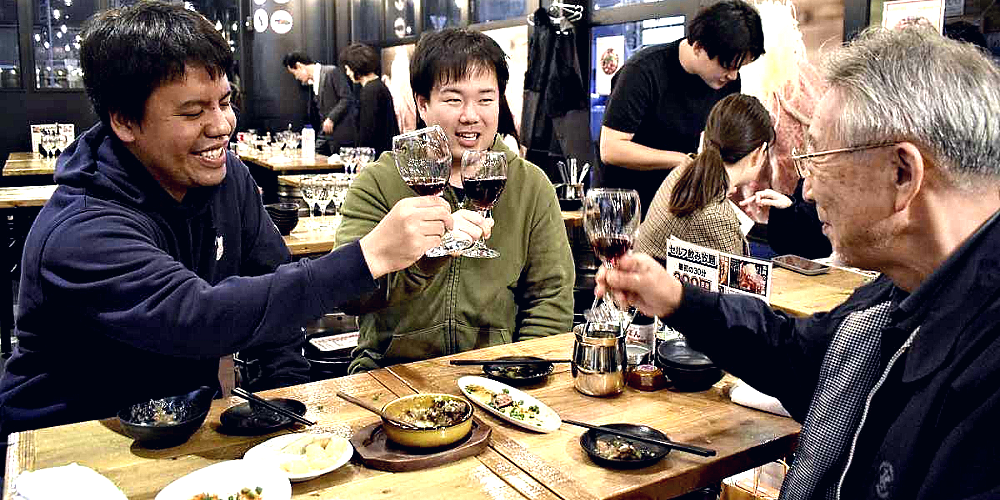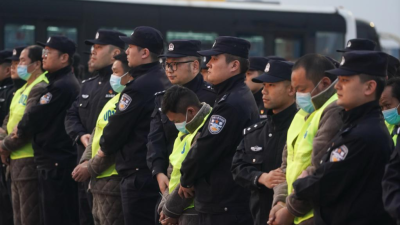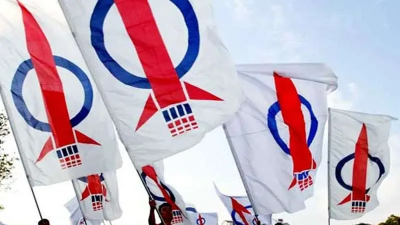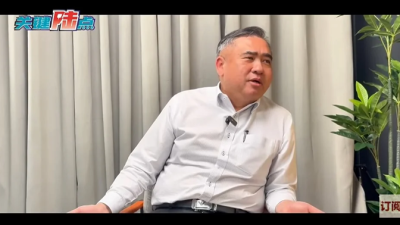
TOKYO: Ahead of the year-end party season, restaurants and bars are steadily receiving reservations for parties.
Due to the COVID-19 pandemic, many companies completely moved away from holding year-end parties while some companies have decided to resume holding them at the request of employees.
The December tradition of companies holding year-end parties is undergoing a change.
‘Can open up’
“I like year-end parties because I can open up to my older colleagues, unlike in the workplace,” said a 33-year-old company employee of Koto Ward, Tokyo, who talked and laughed over wine with his superior at a popular bar in the Shimbashi district of Tokyo in late November.
He welcomes the return of having year-end parties with colleagues.
For him, year-end parties provide an opportunity to ask older employees how to proceed with work and absorb their knowledge while in a relaxed atmosphere.
Although his office has not decided whether to hold a year-end party this year, he said with a smile, “I would love to join a year-end party if there is.”
The bar has taken 10% to 20% more reservations at the year-end period of this year compared to the previous year and some customers have reserved the entire bar for their parties.
“The number of reservations is still smaller than pre-pandemic levels. So, we will make more efforts to attract more customers,” an assistant manager of the bar, said.
Meaning re-examined
After COVID-19 was downgraded to Category V under the infectious disease control law in May, the mood of refraining from going out faded away as hustle and bustle returned to the streets.
Restaurants are trying to lure customers ahead of the busy year-end party season.
Izakaya restaurants operated by major restaurant chain operator Watami Co. not only feature an all-you-can-drink menu with a wide variety of beverages but are also offering a promotion of Omi brand beef and queen crab free of charge for customers reserving course meals.
As of mid-November, the number of reservations more than tripled from a year earlier and increased by over 20% from the pre-pandemic level at the end of 2019.
Eighty-one percent of the reservations have been made by parties of seven or more people, which exceeds last year’s 72% and comes close to 87% in 2019.
“At one point, people opted for year-end parties with a small number of people, while this year, there is a sign of large-scale parties coming back,” a representative for Watami said.
According to a survey conducted in October by Tokyo Shoko Research, Ltd. of 4,747 companies across the nation, a total of 54.4% of the respondents said they would hold year-end or New Year’s parties this winter, close to the pre-pandemic level at about 58%.
The survey found that 21.8% of the respondents held year-end parties before the pandemic but would not hold them this winter, citing such reasons as more employees showed reluctance for such parties and that such parties could be counted as working hours.
On the other hand, 18.2% said they had not held year-end parties before the pandemic and would hold them this winter.
There are companies that decided to hold one because new employees who spent their college years during the pandemic are craving opportunities to communicate with others.
A researcher at Tokyo Shoko Research said, “The COVID-19 pandemic provided an opportunity for companies to re-examine the meaning of their year-end parties.”
Reaction to work from home
There are many people looking forward to their office year-end parties.
A Tokyo-based information communications company decided to have a year-end party for the first time in four years.
Since many employees of the company work at clients’ offices on a regular basis, the company refrained from holding in-house year-end parties and asked employees not to join external year-end parties even if they were invited by clients until last year.
When the company announced it would hold a year-end party this year so that employees could gather, many young employees who joined the company from fiscal 2020 to 2022 responded positively saying things like, “I wanted to attend a year-end party because I never had before” and “I’m excited for the lottery with various prizes.”
A PR representative, 26, said, “Employees in managerial positions also look forward to the party as a good chance to casually ask their subordinates about their non-work-related concerns.”
Rosso, a Tokyo-based system development company, plans to have an in-person, year-end party for the first time in four years in December.
Nearly 90% of its about 100 employees work from home. The company decided to have the party because of employees saying they wanted to interact with each other in person if possible.
Syugo Hotta, professor of communications at Meiji University, said, “Companies feeling a decline in connectedness among employees might have chosen to have year-end parties.
“To build human relationships, there is no better way than face-to-face communications. If year-end parties are optional, not mandatory, they will continue to be loved as a regular event.”
Highest for those in their 20s
According to a survey conducted in November on about 1,000 working adults by Job Soken, operated by Laibo Inc. a Tokyo-based career support company, the percentage of respondents who wanted to join their office year-end parties was highest among respondents in their 20s at 61.5%, followed by 54.9% in their 30s, 52.9% in their 50s and 51.1% in their 40s.
The most common reasons why respondents wanted to join year-end parties were “to communicate with colleagues” with 50.9%, followed by “to build relationships with superiors” with 31.3%.
Major reasons for not wanting to join office year-end parties include “being tired of having to pay attention to other people” with 36.7% and “not feeling the need to have such parties” with 33.8%.
Asked about unnecessary practices for year-end parties, many respondents chose “subordinates pouring liquor in the glasses of their superiors” and “asking people who have drained their glasses about their next drinks,” both hitting the 40-percent levels.
ADVERTISEMENT
ADVERTISEMENT








































